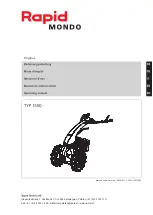
Section 5: Maintenance & Lubrication
RC(M)4715 & RCG(M)4715 Rotary Cutters 334-113M
6/3/20
46
Drivelines
Before each use, check that all driveline shields and
drivelines are in place, undamaged and in working order.
Replace shields and drivelines as needed. Order only
genuine Land Pride parts from your local Land Pride
dealer.
DANGER
!
To prevent serious injury or death:
Tractor power take-off shaft shield, driveline shields, and
gearbox shaft shields must be installed and in good working
condition to avoid driveline entanglement and projectiles
WARNING
!
To prevent serious injury or death:
Do not operate a broken or bent driveline. Such a driveline
will break apart while rotating at high speeds and can cause
serious injury or death. Always remove the implement from
use until the damaged driveline can be repaired or replaced.
Drivelines With Slip Clutches
Friction clutches must be capable of slippage during
operation to protect gearboxes, drivelines, and other
drive train parts. Friction clutches should be “run-in” prior
to initial operation and after periods of inactivity to
remove any oxidation from the friction surfaces. Repeat
“run-in” at the beginning of each season and when
moisture seizes the inner friction plates.
WARNING
!
To avoid serious injury or death:
•
Always follow “Tractor Shutdown Procedure” provided in
this manual before dismounting the tractor.
•
A slip clutch that has been in use or has slipped for as little
as only two or three seconds during run-in may be too hot
to touch. Allow a hot clutch to cool before working on it.
Clutch Run-in
1. Using a pencil or other marker, scribe a line across the
exposed edges of the clutch plates and friction disks.
2. Carefully loosen each of the 8 spring retainer nuts by
exactly two revolutions. It will be necessary to hold
the hex end of the retainer bolt in order to
count the
exact number of revolutions
.
3. Make sure the area is clear of all bystanders and
machine is safe to operate.
IMPORTANT:
Prior to initial operation and after 30
days of inactivity, slip friction disks to remove
oxidation and moisture. Moisture allows disks to slip
easily. Oxidation can prevent disk from slipping
causing driveline damage. This damage is NOT
4. Start tractor and engage power take-off drive for 2-3
seconds to permit slippage of the clutch surfaces.
Disengage power take-off, then re-engage a second
time for 2-3 seconds. Disengage power take-off, shut
off tractor, and remove key. Wait for all components to
stop before dismounting from tractor.
5. Inspect clutch and ensure that the scribed markings
made on the clutch plates have changed position.
Slippage has not occurred if any two marks on the
friction disk and plate are still aligned. A clutch that
has not slipped must be disassembled to separate
the friction disk plates. See
6. Tighten each of the 8 spring retainer nuts on the
clutch housing exactly two revolutions to restore
clutch to original setting pressure.
7.
Allow clutch to cool to ambient temperature before
operating again. Clutch is now ready for use.
8. The clutch should be checked during the first hour of
cutting and periodically each week. An additional set
of scribe marks can be added to check for slippage.
Clutch Run-In
Figure 5-6
Clutch Disassembly, Inspection &
Assembly
Refer to Figure 5-8:
If the clutch run-in procedure performed above indicated
that one or more friction disks did not slip, then the clutch
must be disassembled to separate the friction disks.
Disassembly
Disassembly of clutch is simply a matter of first removing
spring retainer nuts (#1), springs (#2), and bolts (#3) from
the assembly. Each friction disk (#4) must then be
separated from the metal surface adjacent to it.
13693
IMPORTANT:
Not all clutches are assembled the
same with the same number of components. Be sure
















































